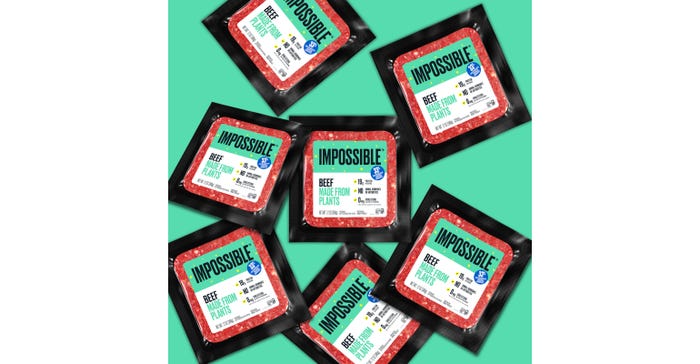Where’s the (Plant-Based) Beef?
Are reports of slow sales last year in the alternative-meat sector changing the outlook?

The alternative meat space has seen ups and a recent down in 2022; what does 2023 look like?Image courtesy of Impossible Foods
The plant-based meat sector is expected to grow anywhere from $15 billion to $18.96 billion, according to varying reports. This doesn’t add up to declining sales of about 14% in 2022, however. Here is a look at how some individual brands did in 2022 and how they are looking at 2023 and beyond.
Looking at both large and small businesses in the sector, it’s hard to imaging slumping sales. There are a multitude of products available today, from alternative-protein pork to plant-based chicken. Even plant-based seafood might trend this year.
Beyond Meat mentioned in Q4 2022 that it would cut 19% of its workforce (200 employees).
In an earnings report last October, President and CEO Ethan Brown commented, “Beyond Meat is implementing measures to drive more sustainable growth, emphasizing the achievement of cash flow positive operations within the second half of 2023. While we believe the current headwinds facing our business and category — including record inflation — are transient, our mission, brand, and long-term opportunity endure. To manage through the current environment and realize the opportunity ahead, we are significantly reducing expenses and sharpening our focus on a set of key growth priorities.”
The company believed it was negatively impacted by ongoing softness in the plant-based meat category overall, especially in the refrigerated subsegment, and by the impact of increased competition.
Beyond Meat expects operating expense savings of about $39 million over the next 12 months and targets positive cash flow within the second half of 2023.
The company is known for its burgers, but it also carries other plant-based products such as sausages, steak, meatballs, chicken nuggets, popcorn chicken, and jerky.
Kellogg's announced plans in June 2022 to sell its MorningStar Farms and Incogmeato plant-based meat brands. The food giant intended to split the company into three, with the plant-based business called “Plant Co.”
In a recent earnings call report, however, Kellogg's stated that, after exploring strategic options, the company has decided to retain its plant-based business, which represents 2% of net sales and offers strong long-term growth prospects.
Kellogg’s fourth quarter 2022 reported sales climbed 12% year over year. On the earnings call, Steve Cahillane, Kellogg’s chairman and chief executive officer said finding a new owner for its largest plant-based brand could prove challenging. When the company first explored a divestiture of MorningStar Farms, he told investors, valuations of CPG assets in the plant-based meat space were “stratospheric.” This has significantly changed as market segment sales have slowed. Kellogg, he said, remains the best parent for MorningStar Farms.
MorningStar Farms, known for its veggie burgers and other meat alternatives, also faced operational issues last year. In the first half of 2022, product sales fell 10% due to a supply disruption with a co-manufacturer.
Impossible Foods had a big year in 2022. It launched its sausage product, the company itself added Australia, New Zealand, and UK to its locations. And, in Canada, Impossible Chicken Nuggets debuted.
Impossible launched new products in 2022, including Impossible Sausage Links, Wild Nuggies, Chicken Patties, and Impossible Bowls. In August, it also unveiled a revamped version of Impossible Beef with 33% less saturated fat than conventional beef from cows.
The company reported 50% retail growth in 2022 and saw its flagship beef product take the top spot in the foodservice sector, outselling every other plant-based meat brand in the US.
Despite being on top, Impossible laid off 6% of its workforce in October. The company said these cuts were made after new CEO Peter McGuinness took the helm and rid some “redundant” positions in a restructuring move.
The company added Sherene Jagla as chief demand office, responsible for sales, marketing, and product development in January 2023, as well as two other key appointments in Q4 2022.
In December, its patent in Europe was revoked. Four additional patents are under scrutiny in the US, filed by Motif FoodWorks, a smaller alternative-protein brand. It claims that Impossible’s products contain heme protein, sugars, and sulfur compounds. The ingredients, Motif said, used to develop the taste and smell of meat and meat alternatives in food products for decades, are not patentable by Impossible.
Planet-Based Foods makes plant-based meat with sustainable hemp. The company just announced this month new formulations for its taquitos including a dairy-free cheese.
The hemp food company was founded in 2019 by former nutritionist and wellness marketer Braelyn Davis; his father, a food scientist and plant-based pioneer, Robert Davis; as well as restaurant industry veteran Ted Cash.
The company also produces hemp-based burgers, sausages, and crumbles.
Cargill’s foray into plant-based products started in 2020, when it introduced a private label line of plant-based patties and ground products. Producing both real meat and alternatives, the manufacturer planned on being a big part of the then-expected 70% growth in global demand for protein over the next 30 years.
The company has teamed up with Spanish-based food tech company, Cubiq Foods on Cubiq’s alternative fats, including Go!Drop emulsion of vegetable oils and water, to its ingredients and plant-based products.
Cargill also has an agreement with pea protein company Puris. Since the start of their relationship in 2019, the pea protein market has exploded, benefiting both companies.
The manufacturer and supplier of bulk food ingredients is relied upon by food and beverage manufactures around the globe. It named a new CEO and chairman of the board in Q4 2022 and two other key appointments in Q1 2023.
Rebellyous Foods was a standout startup in 2022. The plant-based chicken company produces nuggets, tenders, and patties. The company slogan is: No Harm, No Fowl.
Earlier this month, the food manufacturing tech company raised a $9.5M equity round to build its novel production technology. Led by former aerospace engineer, Christie Lagally, Rebellyous will use the investment to deploy its breakthrough equipment and continue its mission to grow accessibility and availability of plant-based meat through tech-backed solutions.
These are just a sampling of the more than 60 meat alternative companies today.
On-Trend
With all of this, trends show that 40% of consumers still plant to purchase meat substitutes in 2023 — hardly a loss.
A recent Datassentials trend report revealed that price is a key component in a consumer’s purchasing decision. The company asked consumers what would motivate them to choose a plant-based burger over a real meat one:
39% lower price
33% healthier
33% tastes like real meat
32% knowing it would be tastier
22% easier to cook with
19% it’s better for the planet
17% it can be flavored with trendy sauces
And, asked if they would rather try plant-based meats at foodservice or retail, 67% of consumers answered retail.
The research firm also surveyed plant-based foods manufacturers, with 93% anticipating their sales will grow or stay the same this year. This is also the same percentage of consumers who answered that the amount of plant protein they have eaten in the past year either increased or stayed the same.
According to The Food Institute, another trend for 2023 in this sector will be clean ingredients — plant-based products using actual ingredients from plants, i.e. mushrooms, beans, other vegetables.
Plant-based seafood could become a growing trend this year as well.
The Meatless Revolution
New products keep coming out, which is a positive for the sector. MorningStar Farms partnered with Pringles on its new Chik’n Fries.
Other plant products include AKUA’s The Kelp Burger, Kelp Krab Cakes, and Kelp Jerky. You guessed it — the products are made with ocean-farmed kelp. The Krab Cakes just came out in summer 2022.
AKUA and SpongeBob SquarePants: Operation Sea Change are teaming up this year to launch a branded kelp patty that will feature reduced plastic packaging.
A lunch kit for children came out last fall, with the slogan: Plant-based fun for everyone. The company, Mighty Yum, was created by two fathers who looked for healthful lunch options for their kids. They both worked in health and wellness and produced this plant-based twist on their favorite nostalgic lunch kit.
Impossible Foods' new product is its Spicy Chicken Nuggets, alongside its Spicky Chicken Patties.
Upton Naturals uses seitan and tempeh for their meatless creations. The independently owned vegan food company is based in Chicago.
Other ingredients in meat alternatives include:
Pea Protein
Jackfruit
Tofu
Lentils
Chickpeas
Tempeh
Seitan
Soy
Black beans
Mushrooms
What We See for 2023
For this year at least, the plant-based arena looks to be at least steady, if not climbing. With all the above-mentioned companies investing in new products and new food technology, they must either know the market is going to be strong or are hedging their bets.
Only one company claimed to have dipped sales, and that does not a bad sign make.
Either way, it’s a good time to be a part of an industry that shines a light on foods coming out with new ingredients, new formulations, and the want to grow. The choices are there, yet it may take a little more convincing those who are still conventional-meat only eaters. Head’s up, marketing folks
About the Author(s)
You May Also Like




